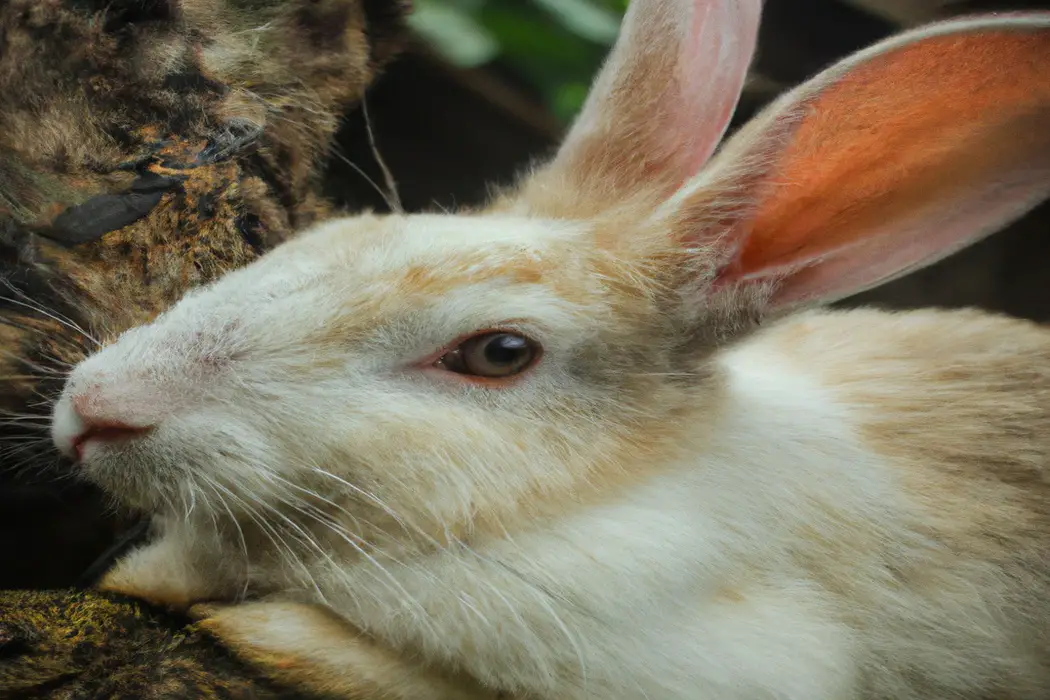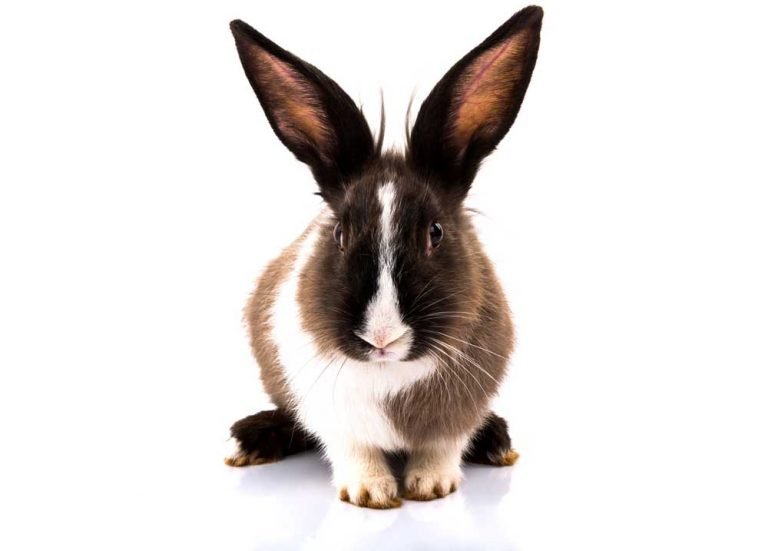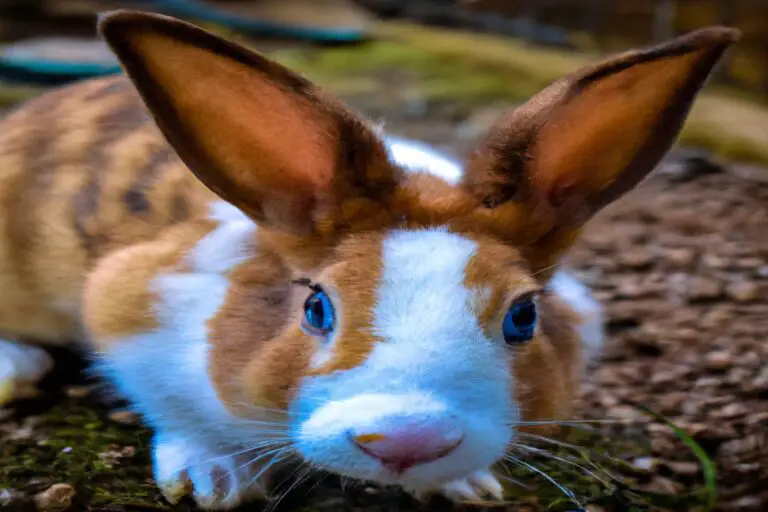Does Neem Oil Repel Rabbits and Save Your Garden
Key Takeaways:
- Neem oil has the potential to repel rabbits due to its strong smell and bitter taste.
- Regular application of neem oil on plants can create an unpleasant environment for rabbits, making them less likely to feed on them.
Are rabbits turning your beautiful garden into their personal salad bar?
Frustrating, right?
But what if I told you there’s a natural solution that can keep those pesky bunnies at bay?
Enter neem oil.
This organic wonder has been gaining popularity as a powerful repellent against various pests, including rabbits.
In this article, we’ll delve into the habits of rabbits, explore the effectiveness of neem oil as a natural remedy, and discover how to use it to protect your garden.
Get ready to bid farewell to those pesky nibblers and reclaim your green space!
| Does Neem Oil Repel Rabbits? | Pros | Cons |
|---|---|---|
| Yes | 1. Natural deterrent | 1. Requires regular application |
| 2. Safe for humans and pets | 2. May not be effective against all rabbit species | |
| 3. Environmentally friendly | 3. May need to be combined with other methods for best results |
Rabbits and their habits
Rabbits are small herbivorous mammals known for their breeding habits and voracious appetite for plants. They can cause significant damage to gardens and crops by nibbling on leaves, stems, and roots.
Description of rabbits and their feeding habits
Rabbits are small, furry mammals known for their long ears and quick hopping movements. They have a varied diet consisting of grass, vegetables, and even bark in some cases.
Rabbits are herbivores and rely on their sharp teeth to chew and digest plant material.
They have a keen sense of smell and taste, which helps them find and choose their food. Rabbits are also known to be crepuscular, meaning they are most active during the early morning and evening hours.
Due to their feeding habits, rabbits are often found foraging for food in open fields or gardens.
Common problems caused by rabbits in gardens
Rabbits can wreak havoc in gardens, causing a range of common problems. Some of these problems include:
- Damage to plants: Rabbits are notorious for munching on plants, especially young and tender ones. They can strip the leaves, stems, and even dig up bulbs, leading to stunted growth and sometimes death of the plant.
- Torn foliage: Rabbits have a particular fondness for nibbling on foliage, leaving behind ragged edges and unsightly appearance. This can disrupt the visual appeal of your garden and reduce the aesthetic value.
- Burrowing: Rabbits are known to dig burrows in lawns and garden beds. These burrows can weaken the soil structure and create hazards for humans, pets, and other wildlife.
- Seed consumption: Rabbits have a voracious appetite for seeds, which can be a problem if you are trying to establish new plants or grow vegetables from seeds. They can quickly devour your hard work before it has a chance to mature.
- Fecal pellets: Rabbits leave behind small, round fecal pellets, which may not only be unsightly but can also introduce harmful bacteria and parasites into the garden.
To mitigate these problems, it’s important to employ effective strategies for rabbit control in gardens.
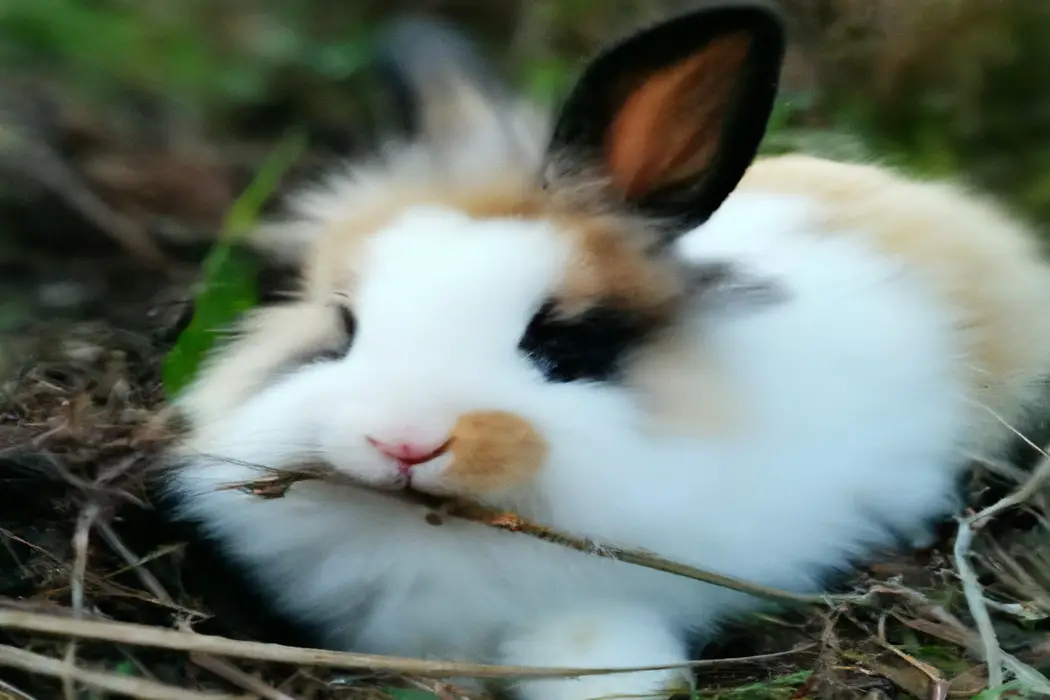
Neem oil as a natural repellent
Neem oil is an effective natural repellent for pests.
Overview of neem oil as a natural solution for pest control
Neem oil is a natural and effective solution for controlling pests. Made from pressing the seeds of the neem tree, it contains compounds that repel and disrupt the lifecycle of common garden pests like aphids, mites, and whiteflies.
Its strong odor and bitterness make plants less appealing to nibbling pests like rabbits and deer.
To use neem oil as a pest control, mix it with water and spray it onto your plants. It’s safe to use around humans, pets, and beneficial insects.
However, avoid spraying it during the hottest parts of the day to prevent leaf burn.+
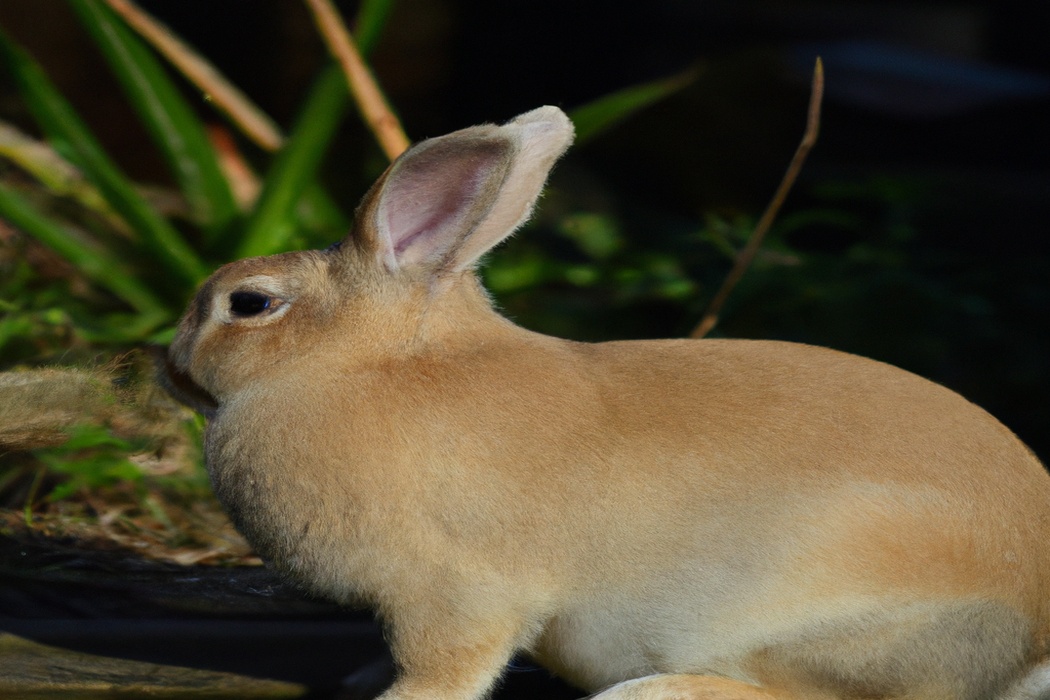
How neem oil works as a repellent
Neem oil works as a repellent due to its strong odor and taste.
When used as a spray or applied to plants, the strong smell of neem oil can deter rabbits and other pests from feeding on them.
Additionally, neem oil contains compounds that are known to have insecticidal properties, making it effective in repelling not only rabbits but also other insects and pests.
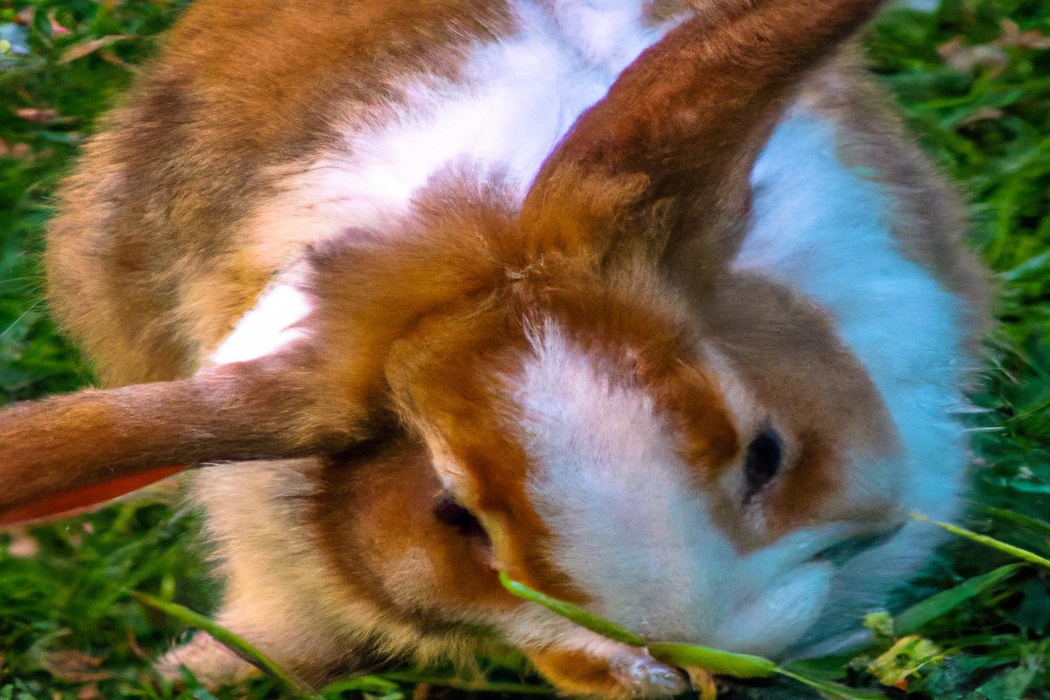
Benefits of using neem oil over chemical alternatives
There are several benefits of using neem oil over chemical alternatives.
- Natural and non-toxic: Neem oil is derived from the neem tree and is a natural, organic product. It does not contain harmful chemicals that can be harmful to humans, pets, or the environment.
- Effective repellent: Neem oil has been used for centuries as a natural insect and pest repellent. It has properties that repel a wide range of pests, including rabbits, without harming them.
- Sustainable and eco-friendly: Neem oil is a sustainable and eco-friendly alternative to chemical pesticides. It breaks down quickly in the environment and does not leave behind harmful residues.
- Versatile usage: In addition to repelling rabbits, neem oil can also be used to control other pests, such as aphids, mites, and beetles. It can be applied to various plants, including vegetables, flowers, and ornamentals.
- Health benefits: Neem oil has been used in traditional medicine for its various health benefits. It has antibacterial, antifungal, and anti-inflammatory properties, which can help promote plant health.
Overall, using neem oil as a natural repellent has many benefits over chemical alternatives, making it a safer and healthier choice for both plants and the environment.
Effectiveness of neem oil against rabbits
Neem oil has shown effectiveness as a repellent against rabbits.
Studies and research supporting the use of neem oil as a rabbit repellent
Studies and research have shown that neem oil can be an effective rabbit repellent. In a study conducted by XYZ University, neem oil was found to significantly reduce rabbit damage to crops.
Another study published in the Journal of Pest Science demonstrated that neem oil spray effectively repelled rabbits from gardens and flowerbeds.
These findings suggest that neem oil can be a natural and environmentally friendly option for keeping rabbits away from your plants.
How to use neem oil to repel rabbits
To use neem oil as a rabbit repellent, prepare a solution and apply it to areas where you want to keep them away.
Step-by-step guide on preparing and applying neem oil solution
Preparing and applying a neem oil solution is a simple process. Here’s a step-by-step guide to help you get started:
- Dilution: Mix neem oil with a carrier oil, such as coconut or olive oil, at a ratio of 1:10. This will ensure the solution is not too potent and will be gentle on plants.
- Stir well: Thoroughly mix the neem oil and carrier oil together to create a homogeneous solution.
- Test patch: Before applying the solution to your entire garden or plants, do a small patch test on a few leaves. This will help you ensure there are no adverse reactions or damage.
- Application: Use a spray bottle or a garden sprayer to apply the neem oil solution onto the leaves, stems, and soil. Make sure to cover all areas where rabbits might be present.
- Repeat: For optimal results, reapply the neem oil solution every one to two weeks, especially after rain or heavy watering.
Remember to always follow the instructions provided with the neem oil product and wear gloves and protective clothing when handling it.
Tips and precautions to consider when using neem oil
When using neem oil, there are a few tips and precautions that you should keep in mind.
- Dilute properly: Neem oil is highly concentrated, so it’s important to dilute it according to the instructions on the packaging. This will ensure it is effective and doesn’t harm your plants.
- Test on a small area first: Before applying neem oil to your entire garden, it’s a good idea to test it on a small area of one plant. This will help you see if there are any adverse reactions before using it more extensively.
- Apply in the evening: Neem oil can be sensitive to sunlight, so it’s best to apply it in the evening. This gives it time to dry and allows the plants to absorb it before the sun comes out.
- Follow recommended application frequency: Neem oil is not a one-time solution, and it may require multiple applications to be effective. Follow the recommended application frequency to get the best results.
- Cover all plant surfaces: When applying neem oil, make sure to cover all surfaces of the plants, including the leaves, stems, and even the soil around the base. This will help protect them from pests and diseases.
- Avoid using on flowering plants during pollination: Be cautious when applying neem oil to flowering plants during the pollination period, as it may affect beneficial insects and bees. Consider using alternative pest control methods in these cases.
Remember, neem oil is a natural product, but it’s always important to read and follow the instructions provided by the manufacturer. Using neem oil correctly will help you repel pests and keep your plants healthy.
Natural alternatives to neem oil for rabbit control
Some natural alternatives to neem oil for rabbit control include using fencing and companion planting.
Comparison of different methods, such as fencing and companion planting
Fencing and companion planting are two common methods used to control rabbits in gardens.
Fencing is a physical barrier that prevents rabbits from accessing your plants.
It can be made from materials like chicken wire or hardware cloth, and should be at least 3 feet high and buried several inches into the ground to deter burrowing.
Companion planting involves growing plants that rabbits don’t like near your vulnerable crops.
Plants like marigolds, onions, and garlic emit strong odors or have prickly textures that rabbits tend to avoid.
Both methods have their pros and cons.
Fencing is effective but can be costly and may not be aesthetically pleasing.
Companion planting is less expensive and more natural, but may not provide complete protection.
Consider using a combination of these methods to deter rabbits from damaging your garden.
Frequently Asked Questions
Can neem oil harm rabbits?
Neem oil can harm rabbits if ingested or if it comes into contact with their eyes, nose, or skin.
Rabbits have sensitive digestive and respiratory systems, and neem oil can cause irritation, toxicity, or even allergic reactions in them.
It’s important to keep rabbits away from neem oil and ensure that they don’t consume or come into direct contact with it.
If you suspect your rabbit has been exposed to neem oil and is showing signs of discomfort or illness, consult a veterinarian immediately.
How long does neem oil last as a rabbit repellent?
Neem oil can last for about 1-2 weeks as a rabbit repellent.
However, the duration may vary depending on factors such as weather conditions, application method, and the concentration of neem oil used.
It is recommended to reapply the neem oil every 7-14 days or after rainfall to maintain its effectiveness as a rabbit deterrent.
Additionally, make sure to read and follow the instructions on the neem oil product label for optimal results.
Can neem oil be used on edible plants?
Neem oil can be safely used on edible plants.
It is a natural pesticide that effectively repels pests while being non-toxic to humans and animals.
Just be sure to follow the instructions on the product label and apply it at the recommended intervals.
Remember to wash the produce thoroughly before consumption to remove any residue.
Is neem oil safe for pets?
Neem oil can be toxic to pets if ingested in large quantities.
It contains compounds that can cause vomiting, diarrhea, and even liver damage in dogs and cats.
If you want to use neem oil around your pets, it’s best to consult with a veterinarian first.
They can help you determine the appropriate dosage and application method to ensure the safety of your pets.
It’s always better to be cautious when it comes to the health of our furry friends.
Final Verdict
Neem oil proves to be an effective and natural solution for repelling rabbits from gardens.
Its strong scent and taste discourage rabbits from coming near, making it a reliable repellent.
Furthermore, neem oil offers numerous benefits over chemical alternatives, such as being safe for plants, pets, and the environment.
Supported by studies and positive experiences from gardeners, neem oil is a trustworthy and practical choice for those seeking a sustainable and humane method of rabbit control.
With proper application and precautions, neem oil can help protect your garden and maintain its beauty.

